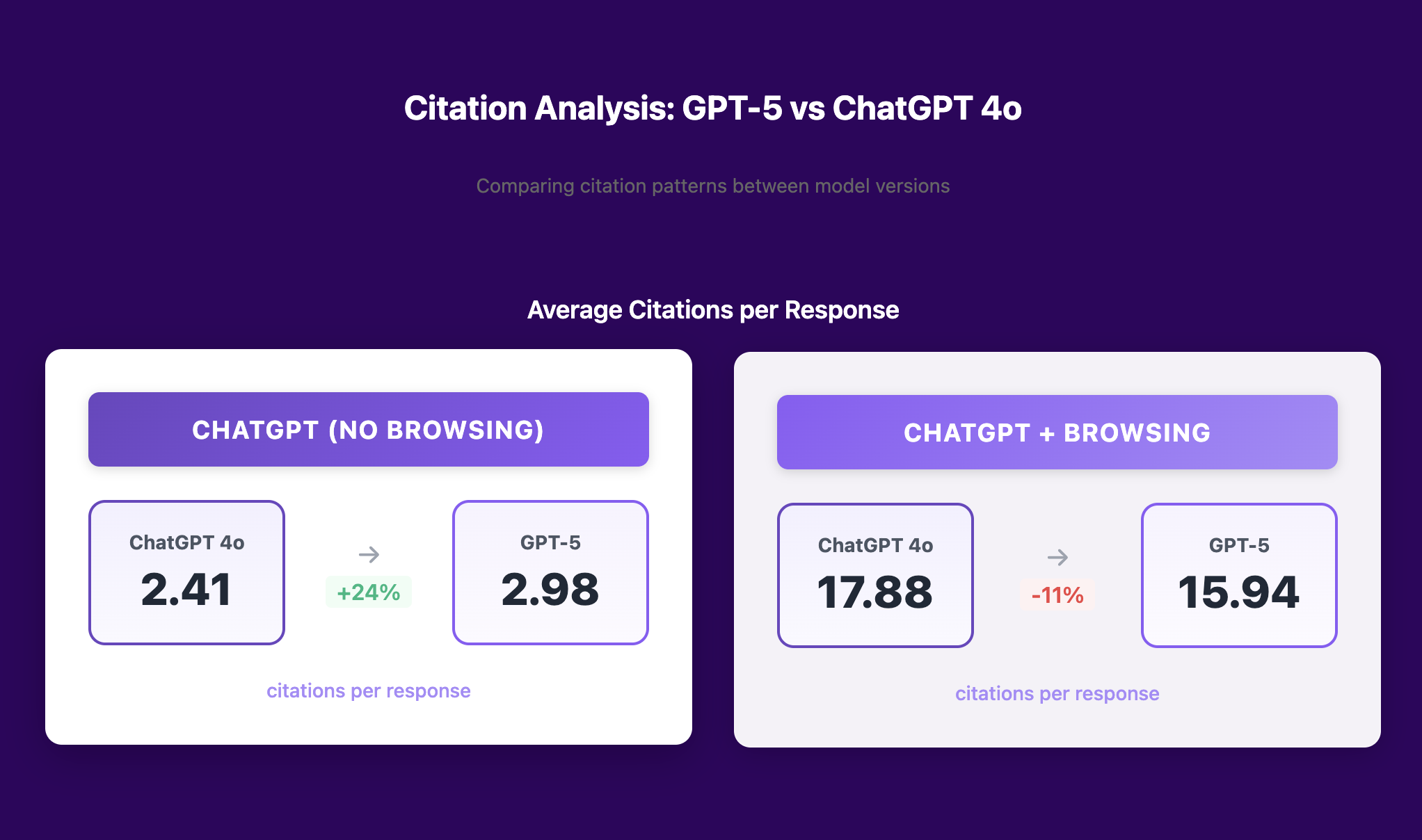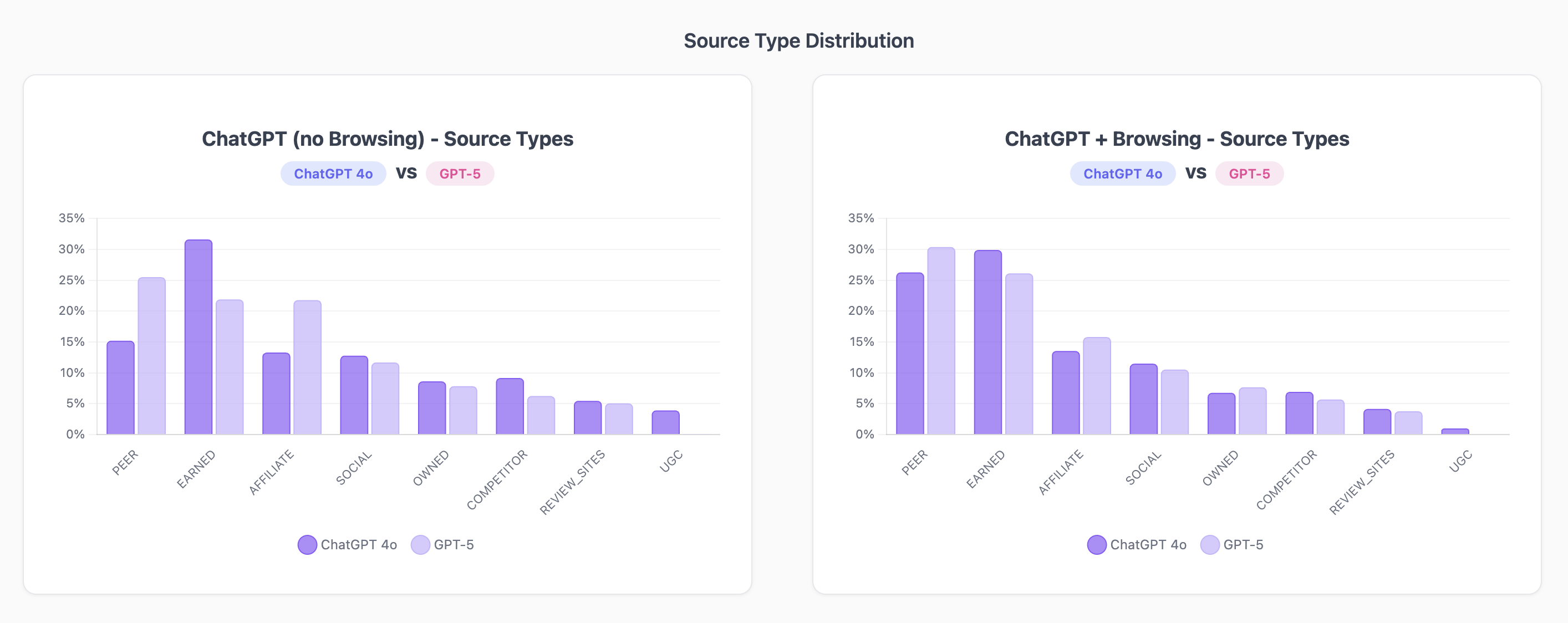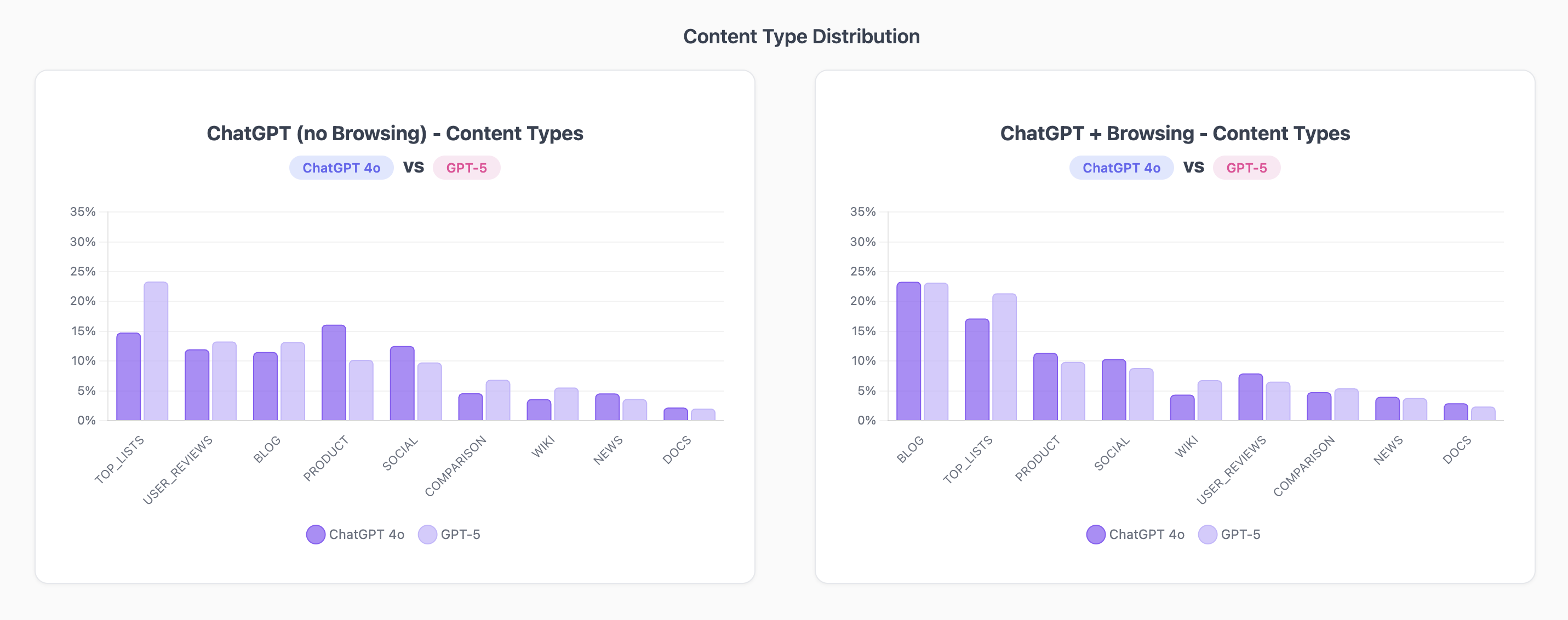
When OpenAI released GPT-5 on August 7, 2025, many expected dramatic changes in how the model would cite and reference content. GPT-5 is now the default (and until further notice, only) model available in ChatGPT. While it's still early days, our initial analysis at XFunnel - comparing citation patterns from GPT-5's first 48 hours against the previous 30 days of ChatGPT 4o data - reveals a surprising story: the transition has been remarkably smooth, with only modest shifts in citation behavior.
Our Study: 2.5 Million ChatGPT Citations Analyzed
At XFunnel, we continuously track how AI search engines cite content across ChatGPT, Perplexity, Gemini, AI Mode and more. For this analysis, we examined:
- 2.5 million citations analyzed comparing GPT-5's first 48 hours against ChatGPT 4o's previous 30 days
- Both browsing and non-browsing modes to understand the full picture
Key Finding: No Dramatic Revolution in GPT 4o vs. GPT-5 Citations
Contrary to expectations of a major shift, our data shows GPT-5's citation patterns are largely consistent with its predecessor:
Citation Volume - Minor Adjustments:
- ChatGPT without browsing: Modest +24% increase in average citations per response
- ChatGPT with browsing: Small -11% decrease in average citations per response
These changes are well within normal variation ranges and suggest GPT-5 is refining rather than revolutionizing its approach.

Average citations per response comparison between ChatGPT 4o and GPT-5
Notable but Measured Changes in GPT-5 Citations
While the overall picture shows stability, we did observe some interesting shifts:
What Sources Does ChatGPT-5 Cite?
The most notable change was in Peer sources, which increased by 10.29 percentage points for non-browsing queries. However, this appears to be a gradual evolution toward more authoritative sources rather than a dramatic pivot.
Earned sources (press and third-party sites) decreased proportionally, but still maintain a strong presence at 21.89% of citations.
To understand these metrics better, here's how we categorize sources at XFunnel:
- Owned - The client's own websites and properties
- Earned - Sites where you can earn mentions through PR, content marketing, and relationship building (such as news outlets, blogs, and influencer sites)
- Peer - Other product or service companies that aren't direct competitors but operate in related spaces

Source type distribution comparison highlighting the shift toward peer-reviewed content
What Types of Content Does ChatGPT-5 Like?
Listicles content saw an uptick of 8.56 percentage points, while Product content decreased by 5.90 points. Again, these represent refinements rather than fundamental changes to how the model operates.
The decline in user-generated content (UGC) citations is noteworthy but represents less than 4% of total citations - a small adjustment in the grand scheme.

Content type patterns reveal modest shifts in how GPT-5 prioritizes different content formats
These changes, while measurable, are too small to draw definitive conclusions yet. We'll need several more weeks of data to determine if these represent true shifts in GPT-5's citation preferences or simply normal variation.
What Technical Improvements Does OpenAI Claim?
While citation patterns remain stable, OpenAI has promised significant technical improvements with GPT-5:
- ~45% fewer factual errors compared to GPT-4o - though user complaints about hallucinations persist
- Better reasoning capabilities with "thinking" built in
- Improved performance across coding, math, and multimodal tasks
- Faster response times - which could lead to users asking more questions
- Larger context window - potentially a path to better memory
- Training data cutoff remains June 2024 - suggesting the focus is on a smarter model rather than more recent information
Over time, we'll see if these improvements indeed enhance quality without disrupting citation patterns.
XFunnel's Ongoing Research into LLM Visibility
At XFunnel, we help leading companies like Wix, Monday, and HiBob optimize their visibility across AI search engines. Our platform tracks:
- When and how brands appear in AI responses
- Which sources have the most influence
- Performance across specific topics
- Competitive positioning
This study is part of our ongoing effort to understand and map the evolving AI search landscape. We've previously analyzed 250,000 citations, consistently finding that while platforms evolve, core patterns remain surprisingly stable. Industry analysis confirms that AI search optimization requires a measured approach rather than radical changes.
The Bottom Line: Should You Be Optimizing Differently for GPT-5?
Our citation data aligns with the growing consensus across the tech community. As one Hacker News user observed, "the race has never been as close as it is now" between AI models. The transition from ChatGPT 4o to GPT-5 shows incremental improvements rather than the game-changing leap many expected.
This sentiment is echoed across the industry. A recent analysis from Gamdala puts it bluntly: "GPT-5 Is an Evolution, Not a Revolution" - describing it as "a much simpler, usable and effective AI product" rather than another leap in intelligence. Even The Atlantic's coverage notes that while GPT-5 "resets the AI race," it does so through refinement rather than reinvention.
For brands and content creators tracking their AI visibility, this means your optimization playbook doesn't need a rewrite. The citation patterns we're seeing at XFunnel confirm what the broader community is experiencing: GPT-5 represents steady progress, not disruption.
About This Research
This analysis was conducted by XFunnel.ai, the leading platform for AI search visibility and optimization. We track citation patterns across ChatGPT, Perplexity, Google's Gemini & AI Mode, and more AI search engines.
Additional Resources
- XFunnel's AI Citation Study - Our comprehensive analysis of 250,000 citations
- Track Your AI Visibility - See how your brand appears across AI search engines
- OpenAI GPT-5 Documentation - Official GPT-5 features and capabilities
For more insights on AI search optimization, contact XFunnel at xfunnel.ai

